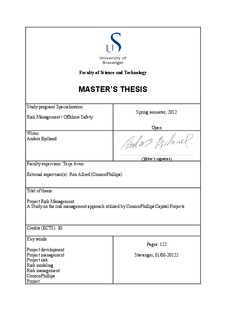| dc.description.abstract | The oil and gas industry on the Norwegian continental shelf is currently experiencing a record-breaking activity level and optimism fueled by high oil prices and major new discoveries made during 2011. The total investments have been at an all-time high the last couple of years and it will most likely continue to rise due to the amount of modification and redevelopment projects, as well as new field developments.
However, with every great opportunity there are normally accompanying threats that need to be managed in order to ensure success. In such a heated climate as experienced in the oil and gas industry, there are many potential pitfalls related to infrastructure development projects, which are best exemplified by the reported cost overruns and delays affecting the
Yme-redevelopment project.
This report asks the question whether the current risk management system utilized by ConocoPhillips is providing value in the execution of major projects by assisting the projects in steering clear of threats with the potential to cause serious cost overruns and schedule delays.
To answer the question, a common background of knowledge related to project and risk management is outlined, before introducing ConocoPhillips as a company, the worldwide project organization and the Norwegian business unit. With the context set, an overview of the project development process is given before going more into the details on the risk management process, the risk analysis modeling and the way risk management is tied into the overall development process.
Based on analysis of current practices, processes and internal requirements, it becomes clear that ConocoPhillips has an extensive and rigorous system set up in order to gradually mature projects until they are ready to be implemented. Risk management plays a key part in the development process where a lot of focus and resources are used to build highly advanced integrated cost and schedule risk models generating P50 values of both project cost and completion dates that are used for project sanction.
The report comes to a conditional positive conclusion, where the risk management system in light of the overall development process is deemed to create value in its contribution of providing predictability in terms of project cost and schedule compared to the project premise.
However, although predictability has an inherent value for the project owners and government, the full benefits of risk management are not being realized.
To unlock the full potential of risk management at ConocoPhillips, this report makes recommendations intended to shift the focus of risk management from the current reporting and verification role, to promoting the use of risk analysis in the early concept-screening phase and in the wider context of value based decision-making that must take into account more than just cost and schedule uncertainty. | no_NO |
